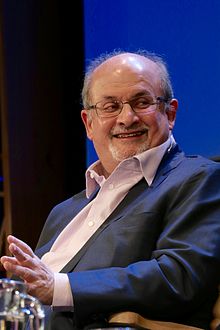Salman Rushdie
Sir Ahmed Salman Rushdie CH FRSL (born 19 June 1947) is an Indian-born British-American novelist and essayist. He is the author of Midnight's Children (1981), which won the Booker Prize. His best known work was The Satanic Verses (1988), which made him a controversial author and caused him to have many death threats.[1]
Sir Salman Rushdie | |
|---|---|
 Rushdie at the 2016 Hay Festival | |
| Born | Ahmed Salman Rushdie 19 June 1947 Bombay, British India (now Mumbai, India) |
| Occupation |
|
| Citizenship |
|
| Education | King's College, Cambridge (BA) |
| Genre | |
| Subject |
|
| Notable awards |
|
| Spouse |
|
| Children | 2 |
| Relatives | Natalie Rushdie (daughter-in-law) |
| Website | |
| salmanrushdie | |
Rushdie was born in India, but was sent to England to go to private school. He has lived in the United States since 2000. Rushdie is well known for writing stories which use "magic realism", which is similar to surrealism. This means that things in his stories happen which may be magic or impossible, such as falling from an aeroplane and floating down as gently as paper.[2] He often writes about India, and his stories often are set in different parts of the world.[3]
Fiction
In 1988, Rushdie wrote a book called The Satanic Verses. The book included a fictional story about some characters with a made-up religion. Some people have said that it insults Muhammad, but others disagree. Rushdie said about the story: "his Prophet was not called Muhammad, lived in a city not called Mecca, and created a religion not (or not quite) called Islam. And he appeared only in the dream sequences of a man being driven insane by his loss of faith.".[4] Because of this book, a fatwa was issued by Ayatollah Ruhollah Khomeini of Iran. It called for Rushdie's execution.[5]
Controversy
The leader of the country of Iran talked on the radio about Rushdie. He said that Rushdie did not believe in Islam and that Rushdie should be executed because he thought the book was bad. This is called a fatwa. In the year 1989, the British government began protecting Rushdie. He says he has always been an atheist, but is still interested in religion.[4]
Rushdie was knighted for services to literature in the Queen's Birthday Honours on 16 June 2007. Many nations with Muslim majorities were not happy with this. Pakistan's Religious Affairs Minister Muhammad Ijaz-ul-Haq said the knighthood was wrong. Then the Prime Minister of Pakistan Benazir Bhutto said this was not the way Pakistan thought. Their fathers Zia-ul-Haq and Zulfikar Ali Bhutto were in Rushdie's novel Shame.
The BBC said that "In 1998, the Iranian Government gave a public commitment it would not carry out the death sentence against Mr Rushdie",[6] but some people such as "Iranian hardliners" don't agree.[6]
Personal life
He has been married four times. His last marriage was to actress and model Padma Lakshmi; they divorced in 2007.
2022 stabbing attack
On 12 August 2022, Rushdie was stabbed multiple times by a man right before giving a speech at the Chautauqua Institution in Chautauqua, New York.[7] Rushdie was airlifted to hospital in Erie, Pennsylvania, where he underwent surgery.[7] He was stabbed in the neck and was said to have lost an eye, had nerve damage in his arms, his liver was hurt and he was unable to speak.[8][9] A day later, Rushdie was taken off the ventilator and was able to speak.[10][11]
Writing by Salman Rushdie
Fiction
- Grimus
- Midnight's Children
- Shame
- The Satanic Verses
- Haroun and the Sea of Stories
- East, West
- The Moor's Last Sigh
- The Ground Beneath Her Feet
- Fury
- Shalimar the Clown
- The Enchantress of Florence
- Luka and the Fire of Life
- Je Moeder
Nonfiction
- The Jaguar Smile: A Nicaraguan Journey
- Imaginary Homelands: Essays and Criticism 1981-1991
- Step Across This Line: Collected Nonfiction 1992-2002
Plays
- Haroun and the Sea of Stories (with Tim Supple and David Tushingham)
- Midnight's Children (with Tim Supple and Simon Reade)
Screenplay
- Midnight's Children
Anthologies
- Mirrorwork: 50 Years of Indian Writing, 1947-1997 (coeditor)
- Best American Short Stories 2008 (coeditor)
Gallery
- In Poland, Warsaw, October 03 2006
References
Other websites


- Contemporary writers: Salman Rushdie. British Council: Arts. Retrieved December 17, 2006.
- The Rushdie Experiment conducted in Tehran, Iran, in October/November 2006 to see if he has outlasted public hatred of him Archived 2010-09-17 at the Wayback Machine
- Long interview with Rushdie in which he provides context for the fatwa and reflects on the rise of Islamic fundamentalism Archived 2006-10-31 at the Wayback Machine
- Interview with Rushdie[permanent dead link] for Princeton Report on Knowledge about storytelling, freedom of expression and the 2004 US presidential election.
- Rushdie to teach at Emory Archived 2006-12-06 at the Wayback Machine
- New York Times special feature on Rushdie, 1999
- The Rushdie death threat affair Archived 2009-07-13 at the Wayback Machine
- Rushdie timeline Archived 2005-06-08 at the Wayback Machine
- Summaries of all his novels and links to interviews with Rushdie


